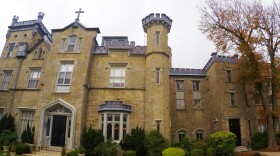On a bulletin board at Skidmore College in Saratoga Springs, New York, a flier advertised a storytelling event for first-generation students to share their experience in their own words.
The event was part of a larger project headed by Senior Associate Dean of Students Luis Inoa. Inoa spent the summer working with a first-gen Skidmore student to research the best practices in first-gen student support at liberal arts colleges around the country. He discovered that storytelling, in particular, is very powerful.
RELATED |
When first-gen students are able to see, hear, or read ways in which students like themselves have struggled — and then what skills they utilized to persist — Inoa said that those students don’t only identify with the struggle, but also with the victories. First-gen students recognize skills in others that they have themselves — skills and assets that will allow them to persist, he said.
WATCH | 'Far From Home'
https://www.youtube.com/watch?v=uKJHb0jrYCo
He created a story-sharing initiative at Skidmore called, “Thoroughbred First,” referencing the college’s mascot and the first-gen students who contribute their stories.
Anjelica Espinoza, a first-gen student from San Antonio, didn’t participate in the event, but she definitely understands the need for it. She’s part of Skidmore’s Opportunity Program, which offers extra support to students with financial need.
RELATED|
Espinoza has a work-study job in the cafe. Meanwhile, most of her classmates don’t have to work, she said.
What also sets her apart from classmates is days can go by without the sight of another Hispanic student, she said, which isn’t surprising considering they make up only 4 percent of the student body.
Still, she said, she feels like she belongs there. Skidmore is helping her accomplish her goals, and making her more independent. The two other students in the “Far From Home” series, Sierra Gonzales at Princeton University and Julio Martinez at the College of New Rochelle, also said that they felt a sense of belonging.
RELATED |

For Gonzales, it was the common academic struggle. No one is really ready for Princeton, she said. Even her prep school classmates would occasionally wonder aloud if they were up to the academic rigor. They bonded over that almost gleeful exhaustion.She goes to parties on the weekend, trying to let off some of the pressure. The work-hard, play-hard culture of the Ivy League has yielded plenty of opportunities to build friendships. At the same time, her closest friends, so far, are those she met over the summer at the Freshman Scholars Institute — a month-long orientation for first-gen, low-income, and minority students.
RELATED|
The College of New Rochelle has a long history serving students like Martinez. He is surrounded by first-gen students, students of color, and people from low-income homes. Sitting in the stands of his soccer game, the crowd cheered in Spanish. Most of his teammates speak Spanish, and a few of their families live in the nearby outer boroughs of Manhattan. They can attend games regularly. Soccer games at New Rochelle, he said, sound a lot like soccer games at KIPP.
Like many freshmen, Julio Martinez burned through his meal allowance within a month. He’s trying to learn how to budget and manage sums of money that are new to him, and how and when to say “yes” and “no” to various expenses. However, that’s not unusual among his classmates, whereas Espinoza and Gonzalez both talked about how peers often wanted to go out to dinner or lunch at places they could not afford.

Martinez feels right at home, he said, but he’s the only one thinking about transferring.
Martinez has an International Baccalaureate diploma, worth 24 credit hours at public universities in Texas. That’s not the case in at the College of New Rochelle. But he hasn’t made up his mind. He said he’s happy where he is, and if he moves back to Texas, it’s only because he found a better deal.
Meanwhile, Inoa’s Thoroughbred First project is full of stories about students who struggled far more. He compiles them into quarterly booklets, and hosts storytelling nights so that students can hear from each other. No two stories are exactly alike, he said, but common threads run through them.
“The college experience will have its bumps in the road,” Inoa said. “There will be some difficulty, but students typically have it within themselves to persist.”
He said he also found allowing students to tell their own stories is a critical part of helping them see themselves as assets to the colleges they attend. And they’ve done it while grappling with the many challenges of being far from home.
This is the final installment of a five-part special report, "Far From Home."
The "Far From Home" series is funded by an Education Writers Association reporting fellowship.
Bekah McNeel is an education reporter based out of San Antonio and can be reached at bekah.mcneel@gmail.com
Copyright 2020 Texas Public Radio. To see more, visit . 9(MDAxODQzOTgwMDEyMTcyNjI4MTAxYWQyMw004))




